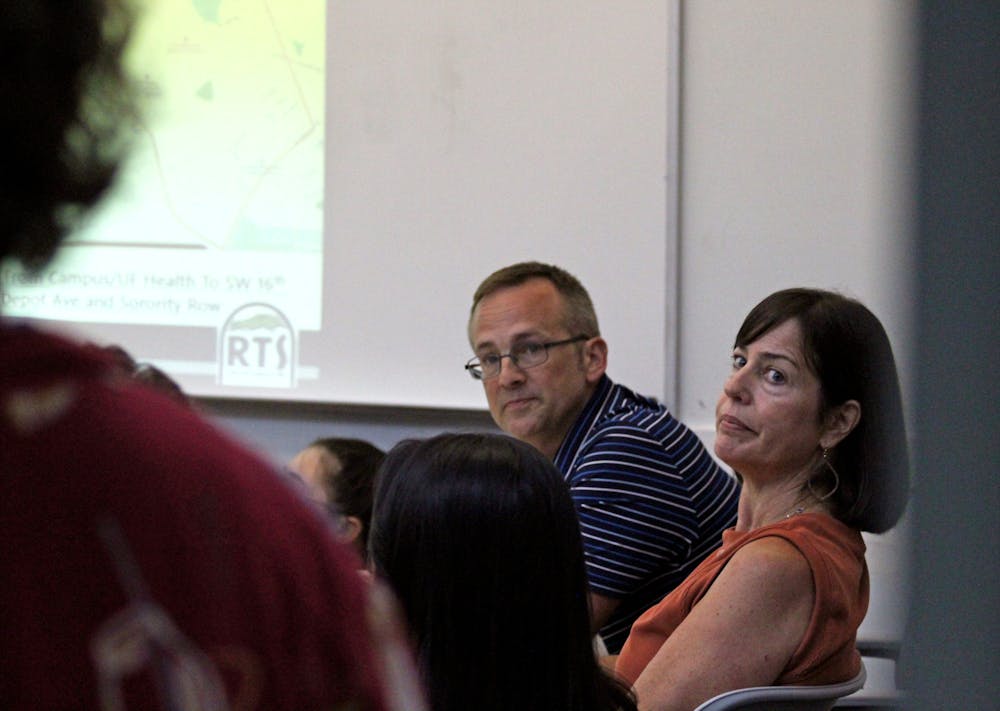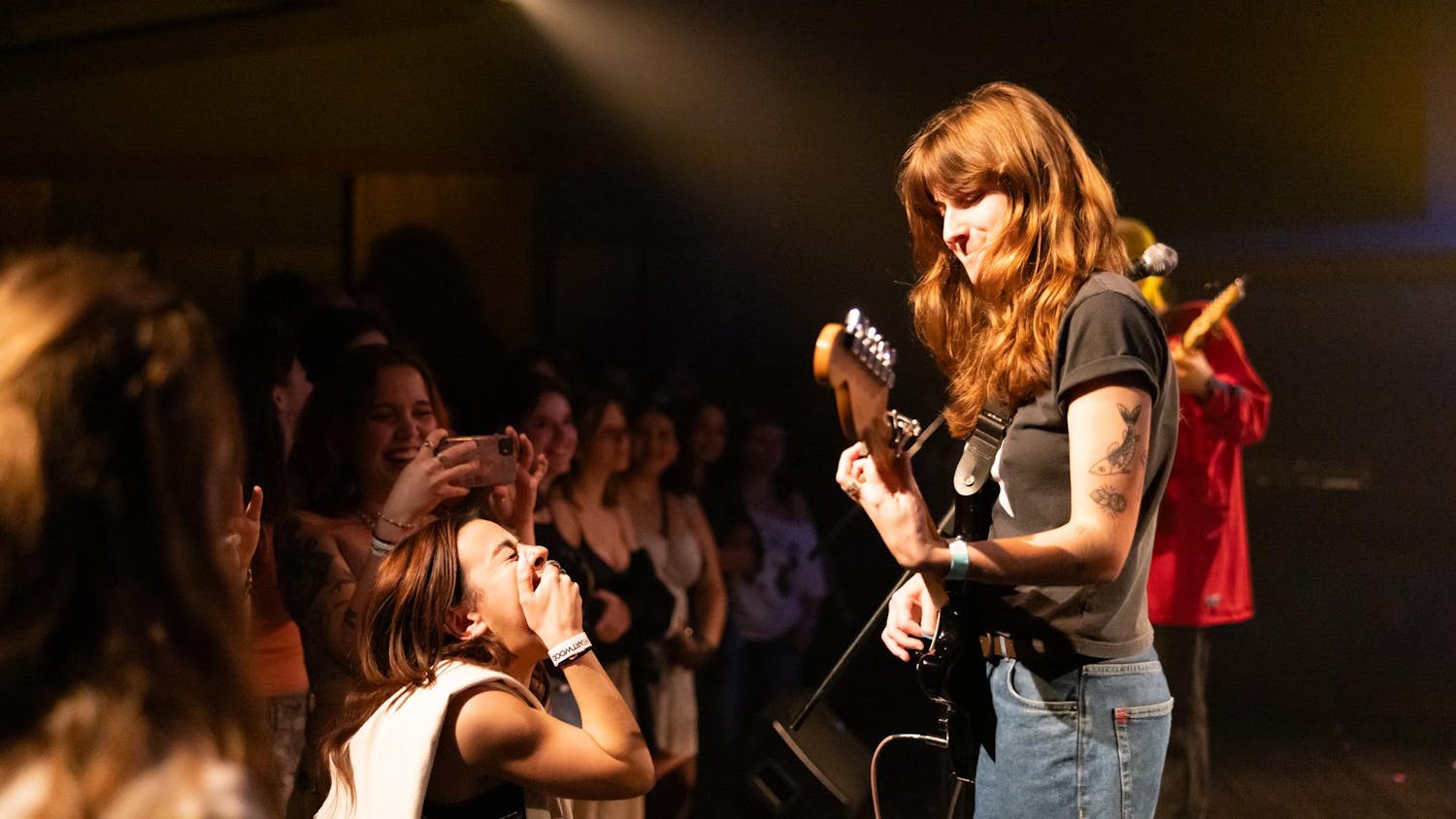A crowd of protesters gathered outside Rawlings Hall late afternoon on May 8, chanting slogans like, “UF admin hear us now, save our routes or we shut it down.”
The protest gathered in light of proposed “alignment changes” to routes 3, 6, 7, 8, 9, 12, 13, 17, 20, 23, 33, 37 and 43. UF had previously announced RTS funding would be cut in half beginning July 1. Routes 16, 21, 28, 34, 35, 38, 46, 118, 122 and 127 will no longer be in service.
Other routes will be merged, such as route 12, one of the most used routes by students living off-campus, and route 35, which will no longer travel to Butler Plaza.
All the buses will run on weekdays from 6:30 a.m. to 11 p.m. All routes, besides 126, will run Saturdays from 7 a.m. to 7 p.m. and Sundays 10 a.m. to 6 p.m. Route 126 will run from 11 a.m. to 7 p.m. on weekends.
Union support
During the pre-rally meeting at Rawlings Hall, members of United Campus Workers, UF’s United Faculty of Florida and Graduate Assistants United spoke about how the decisions will affect RTS drivers and the community.
Marilyn Wende, a UF United Faculty of Florida member, said RTS workers already lack adequate support and funding.
“We are already overworked,” Wende said. “We’re already underpaid, and we’re not receiving the respect we deserve.”
Her voice was accompanied by supportive honking from passing buses and cars.
Other speakers argued route cuts will impact low-income neighborhoods, unhoused populations and disabled individuals who rely on public transport.
With signage such as “Respect RTS Workers” and “Public Transit is a Human Right,” the rally continued peacefully until 5:30 p.m.
The GTEC Meeting
Once the clock hit 6 p.m., the joint-committee meeting between UF and RTS opened to a tense crowd. There were no available seats, so most elected to stand in the doorway of the small conference room.
Jeremiah McInnis, the UF associate director of transportation, answered questions on funding for RTS.
“Our first response hasn't been to cut routes,” McInnis said in response to yelling from the crowd. “We have been over budget by $2 to $3 million for the last three years.”
He admitted route 118, which runs between The Hub and Cultural Plaza, still requires support.
Students’ tuition dollars fund RTS, but they can only contribute so much, said Amy Armstrong, the Director of Communications for Business Affairs.
The set fee students pay per credit hour for RTS hasn’t increased since a 2015 freeze on UF’s transportation budget, leaving no other choice but to reduce routes. She did not explain why funding increases hadn’t come.
“Our first priority has to be our students,” Armstrong said. “It’s their money.”
When asked whether UF had considered the impact route changes could have on Santa Fe College students, McInnis said RTS and Santa Fe have a separate routing contract.
Community response
Routes traveling to UF will now have four buses on campus instead of six, according to UF representatives at the meeting.
Hunter Holtsworth, a former RTS bus driver and ATU member, said he worries about the impact of reducing the number of buses on routes.
“It’s going to really become a major problem for traffic on campus,” Holtsworth said.
Route 8 will gain two buses for peak hours and one for normal operations throughout the rest of the day, sparking concerns about seat availability.
“It’s changes that are going to have to be undone in a couple of months,” he said. His words were followed by finger snapping from the audience.
Jennifer Perez, a UF alumna, spoke during the meeting in support of a relationship between UF and the greater Gainesville community.
“The university failed to actually hear us,” Perez said.
She also said the lack of bus stops near the meeting’s location, the GTEC building on Hawthrone Road, represents UF’s failure to consider community accessibility.
Campus Connector: Have you heard of it?
UF wants to focus on a different transportation service: Campus Connector.
Campus Connector is a route-based shuttle service the university offers to students and staff across campus. Only those with a mobile GATOR-ID can access the ride. Physical UF IDs aren’t accepted as forms of verification because UF is moving forward into a digital landscape, McInnis said at the meeting.
The connector shuttles hold 22 seats and no standing areas. Each has a maximum capacity of 40 students.
Unlike RTS buses, Campus Connector buses cannot carry bicycles. TAPS is looking into a solution, McInnis said.
The service will operate from 6:30 a.m. to 6:10 p.m. and will run approximately every 30 minutes while students are in class. For UF break weeks, the routes will run every hour. This may still pose an issue to students as classes can begin at 7 p.m. and end as late as 10 p.m., a point that was not addressed in the meeting.
To account for longer wait times, UF plans to install additional bus stop covers at the Reitz Union.
Contact Mallory Schumann at mschumann@alligator.org. Follow her on X @SchumannMa92308.






